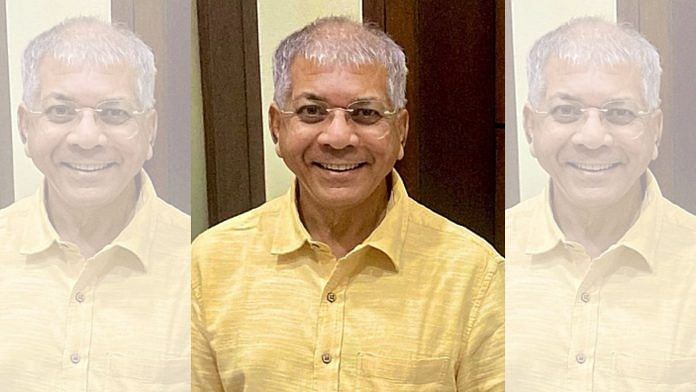
Thank you dear subscribers, we are overwhelmed with your response.
Your Turn is a unique section from ThePrint featuring points of view from its subscribers. If you are a subscriber, have a point of view, please send it to us. If not, do subscribe here: https://theprint.in/subscribe/
Prakash Yashwant Ambedkar (born 10 May 1954), popularly known as Balasaheb Ambedkar, is an Indian politician, writer and lawyer. He is the president of political party called Bharipa Bahujan Mahasangh. He is a three-time Member of Parliament (MP). He was a member of the 12th and 13th Lok Sabha of India and twice represented the Lok Sabha constituency of Akola, Maharashtra. He has served in both houses of the Indian Parliament.
Prakash Ambedkar is the grandson of B. R. Ambedkar, and Ramabai. His father’s name is Yashwant Ambedkar (Bhaiyasaheb) and mother’s name is Meera. The Ambedkar family are followers of Buddhism. He has two younger brothers Bhimrao & Anandraj and a sister Ramabai who is married to Anand Teltumbde. Prakash Ambedkar is married to Anjali Maydeo and they have a son named Sujat.
Organized different mass rallies at national level after the Riddles march case, Rohith Vemula suicide case, Ambedkar Bhavan demolition case, Unna Dalit atrocity case and 2018 Bhima Koregaon violence case.
In 2019, the Dalit politics in Maharashtra received the much-needed buzz soon before the announcement of the general elections. Bharipa Bahujan Mahasangh, a minor political group based primarily in the Akola area and led by Prakash Ambedkar, decided to launch the Vanchit Bahujan Aghadi (VBA) by joining forces with the controversial Muslim party from Hyderabad known as All India Majlis-e- Ittehadul Muslimeen (AIMIM). As this coalition changed the outcome in certain highly contested seats and turned into a nightmare for the Congress and the Nationalist Congress Party, people are more interested in the future of Dalit politics in Maharashtra. As it was believed that independent Dalit politics in Maharashtra were practically extinct, this comeback is crucial. The launch of the VBA could significantly revive the stagnant Dalit voices.
Ambedkar believed that the newly independent India would embrace constitutional morality as a virtue and foster a higher sense of responsibility for its minority and oppressed citizens. He imagined that the liberal constitution would assist former untouchables in breaking free from the caste system and allowing them to join the democratic polity as law-abiding, respectable citizens. He also believed that his political party, the Republican Party of India (RPI), could become an effective political opposition in the parliamentary system and help create a democracy that was more accountable and responsible by substantially drawing from British and American political traditions.
The RPI, however, failed to advance Ambedkar’s great political goal and remained minor in terms of giving most marginalised and oppressed populations leadership. With the notable exception of Dadasaheb Gaikwad’s attempt to organise the landless labourers, it failed to increase social justice concerns, mobilise the poor working class, or create a powerful resistance to the Congress’s hegemonic rule. Due to widespread factionalism, the RPI’s post-Ambedkar Dalit politics were likewise in a constant state of crisis. Without any audible impressive voice, it continued to function as a passive political subject. In contrast, the Dalit civil society, its social counterpart, experienced a bright visibility in the 1970s and 1980s. The birth of the Dalit Panthers, the creation of sociocultural and religious organisations (Buddhist faith-based organisations), and the construction of bourgeois class associations (Kanshi Ram’s BAMcEF) have all contributed to the development of the Dalit society. In this way, it has set itself apart from normal political discourse and provided nuanced reflection on the social and cultural goals of the community. The post-Ambedkar Dalit consciousness has recorded its obvious presence in the social spectrum, particularly in everyday economic, cultural, and intellectual realms.
Although the present Dalit social spectrum has been involved in the post-political life conditions, Ambedkar’s heightened political ambitions to build an enlightened political community through the RPI appear lifeless and insignificant.
Dalits have organised statewide, powerful protests on a few times. The Dalits organised and staged violent protests in the aftermath of three significant events in the post-1990 era. Initially, the Dalits protested in the streets in 1997 over the Mumbai statue of Dr. Ambedkar being vandalised. In response to the large-scale demonstration, the police opened fire, killing 10 Dalit youngsters. Second, on September 29, 2006, murders took place in the small village of Khairlanji in the Bhandara district, killing four members of the Bhotmange family who belonged to the Mahar caste. Before being executed, the family’s female members were paraded in public naked. After the tragedy, which happened over two months ago, Dalits began to demonstrate against the atrocities in all of the main cities after the story circulated widely on electronic media. Global news coverage increased pressure on the administration to act quickly. Third, when some lumpen right-wing gangs attacked the Dalits gathered in Bhima Koregaon, near Pune, to observe an annual communal event of historic significance, a vibrant and robust Dalit protest was once more seen on the streets of Maharashtra. The Dalit response was unplanned and enraged, and the demonstrators stopped the state’s regular operations. The occasional awakening of the Dalit people is evidence that the Dalit movement has maintained its radical, unyielding qualities and is capable of waging armed street battles against the Brahminical forces. While many local Dalit communities protest as flash mobs, frequently autonomously organised to voice their issues, these civil society struggles are frequently delinked from their political equivalents.
Vanchit Bahujan Aghadi (VBA) head Prakash Ambedkar on Monday said his outfit will contest all elections in 2024 in alliance with the Shiv Sena faction led by Uddhav Thackeray.
Speaking about the alliance Prakash Ambedkar said, the coming together of VBA and Shiv Sena (UBT) was the start of “Politics of Change”.
These pieces are being published as they have been received – they have not been edited/fact-checked by ThePrint.

COMMENTS